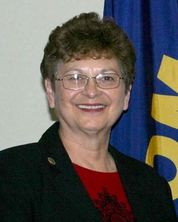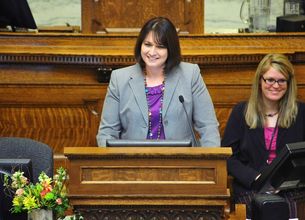 Carol Juneau
Carol Juneau
She moved to Lawrence, Kansas, to pursue her higher education, earning a business degree from Haskell Institute.
During the 1950s and 1960s Carol Juneau and her husband Stan “worked as part of a Bureau of Indian Affairs relocation program to integrate Native Americans into urban, mainstream culture.”
During this time Carol’s daughter Denise was born, on April 5, 1967.
When Carol was 24-years old she moved to Montana, in 1969. Denise Juneau was 2-years old at the time. The family settled into Billings and Carol and Stan continued their studies at Eastern Montana College.
Carol earned a psychology degree there and eventually a master’s degree in school administration from the University of Montana. In 1974 the family moved to Stan’s hometown of Browning.
On February 8, 1999, the Helena Independent Record had an article called “Juneau works to give tribes a voice.” It reported that Carol Juneau lived on the Blackfeet Reservation for 25 years, “earned three degrees and devoted her career to public education.
We’re told that she and her husband Stan “have worked with schools in Browning and Heart Butte for the better part of the past two decades.” Carol even became a Stay-in-School program director. Stan Juneau “was a school counselor, athletic director and a superintendent before retiring.”
When Representative George Heavy Runner stepped aside in 1998 “to take a post on the Blackfeet Tribal Council” Carol Juneau “saw an opportunity” and got herself appointed to the seat.
In that position she worked “furiously to advance lawmakers’ awareness of Indian issues and needs.” To do this she pointed out that around 10% of elementary school students and 7% of the high school students in Montana are Indian yet just 2% of the teachers are.
Back in the 1999 Montana Legislature, Carol Juneau was just one of four Indians serving, three Democrat and one Republican.
In the first week of February 1999, Carol Juneau spoke in front of the House Democratic caucus, telling them that “Indian people have been really good to Democrats; you need to be good to them.”
The article went on to note that:
In her own home, education has also taken a top priority. Both of Juneau’s children have advanced college degrees.
And unlike many other Browning-area teachers, Juneau raised her family right in the sometimes-rough reservation town of Browning.
‘I wanted my kids to grow up in an Indian community,’ Juneau said, adding, ‘You need to be part of the community where you live and work.’
Above all, Juneau wants to make clear that while Indian tribes are sovereign nations, tribal members ‘are citizens of the state of Montana, the same as any other citizens.’
‘I’d like to see that Indian people and Indian tribes in Montana aren’t left outside of everything,’ she said.”
On January 5, 2009, the Missoulian had an article called “Profile: Indian lawmaker Carol Juneau.”
This was 10 years later and the article opens by telling us that Carol Juneau was “the longest-serving member of the Montana Legislature’s American Indian caucus.”
Even back then she was working on water compact issues, something we’re still grappling with…always grappling with.
We’re told that Juneau had a bill to “extend the Reserve Water Rights Compact Commission,” which was “the only state commission in the country dedicated to striking water compact agreements between state and tribes with federally reserved water rights.”
What we’re getting at is the recent transfer of Kerr Dam to the Salish and Kootenai tribes in 2015, something that Juneau anticipated six years before and was working toward.
Besides that there was “the need to increase the state’s education budget, expand the definition of hate crimes and regulate the sale of energy drinks.” The latter was often confused with alcoholic drinks.
She’d come far, though she was still “most noted for the successful passage of the Indian Education for All Act” in 1999.
What the Act did was “mandate that Native history and contemporary tribal issues be taught to all K-12 students, a law ignore for more than 30 years.”
That included the time when her own daughter was educated in the state.
Denise Juneau
 Denise Juneau, Feb 2013
Denise Juneau, Feb 2013
Kristen Cates wrote the article and it profiles the then-upcoming swearing in ceremony for Denise Juneau.
Juneau “jokes that she garnered more votes in Montana than Obama – she had 234,000 votes to his 231,000.” Putting “40,000 miles on her car” during her campaign surely helped.
This likely surprised her mother. Carol Juneau “said that, at first, it was hard to believe her daughter when she called and said she wanted to run for office.”
She goes on to say that “Denise was a relatively shy young girl” and “didn’t try to take leadership roles in things. When she was in high school, she became more assertive.”
“She learned about her heritage through cultural events her family attended, but never in the classroom.”
Because Denise was so tall she played basketball. “Traveling outside of Browning for games and tournaments was sometimes a horrifying experience because she and her teammates hear racist taunts, had rocks thrown at their bus and were spit at.”
Denise was inspired by her high school English teacher, Anna Lunick. After graduating from Browning High School in 1985, Denise headed off to Bozeman for her college years and earned a degree in English in 1993.
“Juneau said there was some culture shock when she left Browning to attend college in Bozeman, where few people looked like her.”
Boston was worse, Juneau said, for that’s where Harvard was located. It took her just a year to get her masters degree in education from the school, in 1994. She later said, “Boston was great, but I don’t ever want to live there.”
After that Juneau went to New Town, North Dakota, for a year to teach on the Fort Berthold Indian Reservation, “where her mother grew up.”
In 1995 she came back to Montana to teach English at her old high school. By 1997 she was ready for a change and headed down to the University of New Mexico to get her doctorate. She did that for a year until she “gave it up and moved back to Montana.”
It was 1998 and Denise was ready to get “her feet wet in the Indian Education for All program under Nancy Keenan’s administration at the Office of Public Instruction as an Indian education specialist,” a program “funded solely with federal dollars.”
She held that OPI position until 2001 and then went to Missoula to attend law school.
By 2004 she was done there, law degree in hand. It was off to “work as a clerk for the Montana Supreme Court” after that, a position that lasted until 2005, and then “at a law firm in Missoula, where she dealt with tribal law” until 2006.
In 2006 Denise Juneau moved back to Helena to work “as director of Indian Education for All at OPI under then-Superintendent Linda McCullough.”
By 2008 she was running for her boss’s old position and as we saw, she won it. She did so again in 2012 and now in 2016 she’ll be running for the U.S. House.

